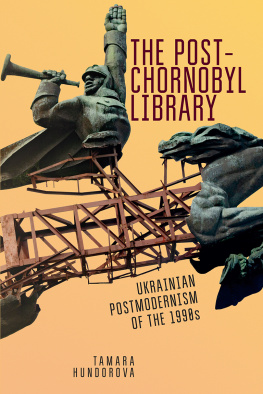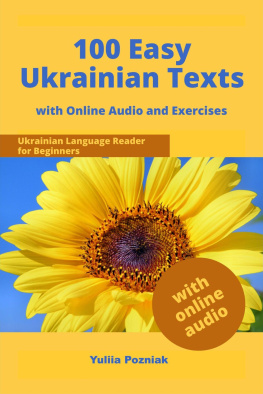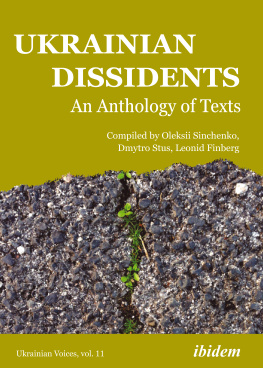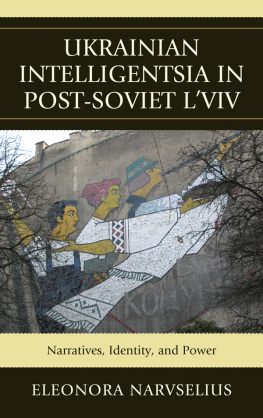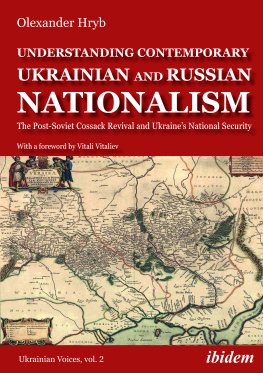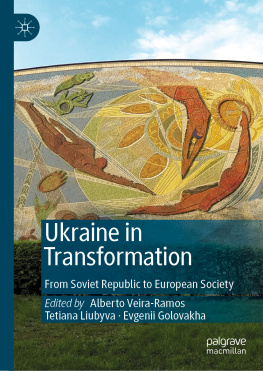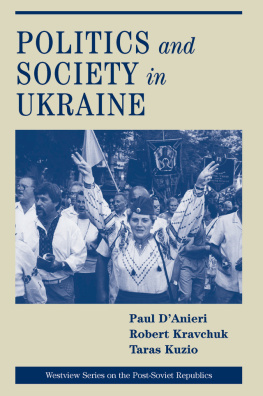Contents
Ukrainian Studies
Series Editor: Vitaly Chernetsky (University of Kansas)
 | Harvard Ukrainian
Research Institute |
THE POST-CHORNOBYL
LIBRARY
UKRAINIAN
POSTMODERNISM
OF THE 1990S
TAMARA
HUNDOROVA
TRANSLATED BY SERGIY
YAKOVENKO
BOSTON
2019
Library of Congress Cataloging-in-Publication Data
Names: Hundorova, T. I., author. | IAkovenko, Serhii, translator.
Title: The post-Chornobyl library : Ukrainian postmodernism of the 1990s / Tamara Hundorova ; translated by Sergiy Yakovenko.
Other titles: Pisliachornobylska biblioteka. English
Description: Boston : Academic Studies Press, 2019. | Series: Ukrainian studies | English translation of: Pisliachornobylska biblioteka : ukranskyi literaturnyi postmodern. | Includes bibliographical references.
Identifiers: LCCN 2019031932 (print) | LCCN 2019031933 (ebook) | ISBN 9781644692387 (paperback) | ISBN 9781644692394 (adobe pdf)
Subjects: LCSH: Ukrainian literature--20th century--History and criticism. | Postmodernism (Literature)--Ukraine. | Chernobyl Nuclear Accident, Chornobyl, Ukraine, 1986--In literature.
Classification: LCC PG3916.2 .H8613 2019 (print) | LCC PG3916.2 (ebook) | DDC 891.7/909004--dc23
LC record available at https://lccn.loc.gov/2019031932
LC ebook record available at https://lccn.loc.gov/2019031933
English translation copyright 2019 Harvard Ukrainian Research Institute
All rights reserved.
ISBN 978-1-64469-238-7 (paperback)
ISBN 978-1-64469-239-4 (adobe pdf)
ISBN 978-1-64469-240-0 (epub)
On the cover: Viacheslav Poliakov, from the LvivGods Will series, 2017. via-poliakov.com
Reproduced by the authors permission.
Cover design by Ivan Grave.
Book design by PHi Business Solutions.
Published by Academic Studies Press.
1577 Beacon Street
Brookline, MA 02446, USA
www.academicstudiespress.com
Acknowledgements
I would like to express my deepest gratitude to Academic Studies Press, in particular to its Slavic program for publishing this book. This publication has become possible thanks to the financial support of Harvard Ukrainian Research Institute (HURI), which is a leading institution of Ukrainian Studies. During my various tenures at HURI I had an opportunity to grow as a scholar and wrote the initial pages of this book. I am particularly grateful to George G. Grabowicz: his knowledge of literature, and the ability to analyze it having respect for the text, has consistently impressed meI will always remain his student in this regard. I greatly appreciate Vitaly Chernetsky and Oleh Kotsyubas friendly support and assistance throughout this project, from the inception of an English-language edition of the book and all the way to its publication. I am deeply grateful to the translator of this book, Sergiy Yakovenko, with whom I share not only my alma mater but also a long-standing love of modernism, Nietzsche, and literature of the beginning of the twentieth century. Finally, I am thankful to the Kyiv publishing house Krytyka which believed in me and published the original Ukrainian edition of my Post-Chornobyl Library.
Translators Acknowledgements
I want to thank, first of all, Tamara Hundorova, my mentor and colleague, who entrusted the translation of her book to me. It has been a great pleasure for me, an intellectual challenge, and enormous responsibility. It is an equally pleasant task to thank Harvard Ukrainian Research Institute for this opportunity; in particular, I am grateful to Oleh Kotsyuba and Vitaly Chernetsky for their guidance and attention to my work. Finally, I thank the Academic Studies Press and especially Stuart Allen, the editor of my translation, for his patience, diligence, and inventiveness.
A Note on Transliteration
I n the body of the text, we use the conventional transliteration for East Slavic names and locations. However, for the notes and citations we use a simplified version of the Library of Congress system of transliteration, omitting ligatures for those Cyrillic characters that are rendered by more than a single Latin character. Indication of the Ukrainian soft sign is omitted in the body of the text but is retained in the notes, where it is rendered with a prime. For example, is transliterated as Olha Kobylianska in the body of the text and as Olha Kobylianska in citations.
Preface
T here are many theories of postmodernism. From my perspective, it begins in 1946, when in the first issue of the almanac Mystetskyi Literaturnyi Rukh (MUR, or Artistic Literary Movement), Jacques Hnizdovsky (Iakiv Hnizdovskyi) set in to talk about Ukrainian grotesque. He maintained that postwar Europe was returning to the world of naive emotions, and that the new era was breaking out with an appreciation for Sancho Panza and a mistrust of the intellectual Don Quixote. The era of Don Quixotes is over, and under way is the epoch of the naive, practical, and emotional Sancho Panza, claimed Hnizdovskya graphic artist who in his art discovered an atomic plurality of worldview and in his paradoxical thinking echoed the artistic postmodern of the Dutchman Morris Cornelis Escher.
In that same issue of MUR, Viktor Petrov (Ber) discussed the new era of the split atom and envisioned that art would lose its modernist negative-experimental color and would become positive, real, and natural, although its naturalness and reality will be the nature and reality of the technical world.
The actual aesthetic thinking that I associate with the postmodernism of the end of the twentieth century is tied to the oeuvre of the American writer John Barth, who in 1996 labeled postmodernism as endism: endings, endings everywhere: apocalypses large and small,
To me, this kind of story is postapocalyptic postmodern narrative.
This suspension-in-play is, for me, embodied in the carnivalesque Ukrainian postmodernity, which begins simultaneously with the Chornobyl explosion in April 1986. Another version of postmodernism forms later, in the 1990s. It is characterized by a recombination of fragments and modes of writing, which shows similarities with the process of postapocalyptic existence. Overall, it is exactly the Chornobyl discourse that provokes the deployment of Ukrainian postmodernism because Chornobyl is not only associated with a socio-techno-ecological catastrophe that occurred in a certain time and place but also signifies a symbolic event that projects the postapocalyptic text about the postponement of the end of civilization, culture, and human into the postatomic era.
My book about postmodernism focuses on the post-Chornobyl library. In my view, the post-Chornobyl library is a metaphorical image of culture that is threatened and salvaged at the same time, of culture thatlike the ark, museum, temple, and listis a bridge between real life and fiction, the past and the present, self and other, play and apocalypse, high and mass culture. I see Chornobyl as an event that legitimized the beginning of Ukrainian postmodernity, and the post-Chornobyl library as a number of texts, topoi, topograms, quotes, discourses, and canons that atomize Ukrainian culture and turn it into a process unfolding not only from the beginning to the end but also backwards, from the end to the beginning: a postapocalyptic narrative. The postmodern library is an archive that preserves culture and renders it relevant; it is also a field of the resurfacing of past complexes and old taboos. Polyphonic and polysemantic, the post-Chornobyl library is not reducible to a single overarching narrative: it is written on the margins of other texts and at the ends of others stories, thereby filling in the gaps of the national culture.

